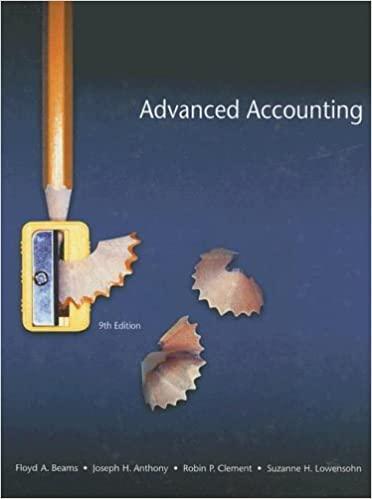Question
eridan Company is considering the purchase of a new machine. Its invoice price is $134,000, freight charges are estimated to be $3,300, and installation costs
eridan Company is considering the purchase of a new machine. Its invoice price is $134,000, freight charges are estimated to be $3,300, and installation costs are expected to be $5,500. Salvage value of the new machine is expected to be zero after a useful life of 4 years. Existing equipment could be retained and used for an additional 4 years if the new machine is not purchased. At that time, the salvage value of the equipment would be zero. If the new machine is purchased now, the existing machine would be scrapped. Sheridan's accountant, Lisa Hsung, has accumulated the following data regarding annual sales and expenses with and without the new machine.
| 1. | Without the new machine, Sheridan can sell 11,000 units of product annually at a per unit selling price of $90. If the new unit is purchased, the number of units produced and sold would increase by 25%, and the selling price would remain the same. | ||
| 2. | The new machine is faster than the old machine, and it is more efficient in its usage of materials. With the old machine the gross profit rate will be 29% of sales, whereas the rate will be 30% of sales with the new machine. (Note: These gross profit rates do not include depreciation on the machines. For purposes of determining net income, treat depreciation expense as a separate line item.) | ||
| 3. | Annual selling expenses are $176,000 with the current equipment. Because the new equipment would produce a greater number of units to be sold, annual selling expenses are expected to increase by 10% if it is purchased. | ||
| 4. | Annual administrative expenses are expected to be $110,000 with the old machine, and $123,000 with the new machine. | ||
| 5. | The current book value of the existing machine is $44,000. Sheridan uses straight-line depreciation. | ||
| 6. | Sheridan's management has a required rate of return of 15% on its investment and a cash payback period of no more than 3 years. |
Answer the following. (Ignore income tax effects.)
Calculate the annual rate of return for the new machine. (Round answer to 1 decimal place, e.g. 15.5%.)
| Annual rate of return | % |
Compute the cash payback period for the new machine. (Round answer to 2 decimal places, e.g. 15.25.)
| Cash payback period | years |
Compute the net present value of the new machine. (If the net present value is negative, use either a negative sign preceding the number e.g. -45 or parentheses e.g. (45). Round factor values to 5 decimal places, e.g. 1.25124 and final answer to 0 decimal places, e.g. 5,275.)
| NPV | $ |
Sheffield Corporation is considering purchasing a new delivery truck. The truck has many advantages over the company's current truck (not the least of which is that it runs). The new truck would cost $55,440. Because of the increased capacity, reduced maintenance costs, and increased fuel economy, the new truck is expected to generate cost savings of $8,400. At the end of 8 years, the company will sell the truck for an estimated $27,700. Traditionally the company has used a rule of thumb that a proposal should not be accepted unless it has a payback period that is less than 50% of the asset's estimated useful life. Larry Newton, a new manager, has suggested that the company should not rely solely on the payback approach, but should also employ the net present value method when evaluating new projects. The company's cost of capital is 8%. (a) Compute the cash payback period and the net present value of the proposed investment. (If the net present value is negative, use either a negative sign preceding the number eg -45 or parentheses eg (45). Round answer for present value to 0 decimal places, e.g. 125. Round answer for Payback period to 1 decimal place, e.g. 10.5. For calculation purposes, use 5 decimal places as displayed in the factor table provided.)
| Cash payback period | enter the cash payback period in years rounded to 1 decimal place years | |||
| Net present value |
Step by Step Solution
There are 3 Steps involved in it
Step: 1

Get Instant Access to Expert-Tailored Solutions
See step-by-step solutions with expert insights and AI powered tools for academic success
Step: 2

Step: 3

Ace Your Homework with AI
Get the answers you need in no time with our AI-driven, step-by-step assistance
Get Started


